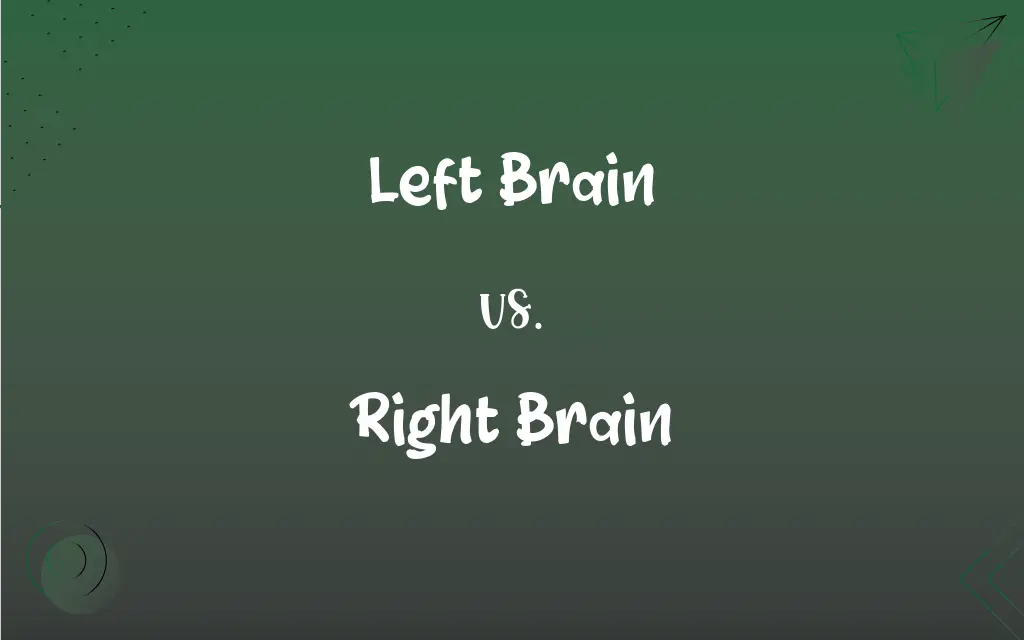Left Brain vs. Right Brain: What's the Difference?
Edited by Janet White || By Harlon Moss || Updated on October 28, 2023
The left brain is associated with logical, analytical tasks, while the right brain is linked to creativity and intuition.

Key Differences
The left brain and right brain refer to the two hemispheres of the human brain, each responsible for distinct cognitive functions. Traditionally, people believe these hemispheres process information differently.
The left brain is often tied to logical thinking, analytical processes, and objective assessment. This hemisphere is where methodical and systematic thoughts often originate, emphasizing details.
Conversely, the right brain is believed to govern creativity, imagination, and intuitive actions. It's where holistic thought processes arise, emphasizing the big picture and artistry.
It's worth noting that while the left brain and right brain distinctions exist, everyone uses both hemispheres constantly. No one is purely "left-brained" or "right-brained."
Recent scientific studies suggest that the dichotomy between left brain and right brain is an oversimplification. Both hemispheres collaborate for nearly all cognitive tasks.
ADVERTISEMENT
Comparison Chart
Associated Thinking
Logical and Analytical
Creative and Intuitive
Task Emphasis
Details
Big Picture
Common Descriptions
Methodical, Systematic
Artistic, Imaginative
Functions
Mathematics, Language
Spatial Abilities, Facial Recognition
Perception
Linear and Sequential
Holistic and Simultaneous
ADVERTISEMENT
Left Brain and Right Brain Definitions
Left Brain
Hemisphere of the brain tied to logical processing.
Math problems engage the left brain due to their logical nature.
Right Brain
The part of the brain associated with holistic perception.
Musicians often rely on their right brain when composing melodies.
Left Brain
Side of the brain responsible for systematic thought.
Learning grammar involves the left brain's analytical skills.
Right Brain
Brain region connected with simultaneous processing.
Recognizing faces is a task of the right brain due to its holistic perception.
Left Brain
The part of the brain linked with detailed analysis.
Scientists often employ their left brain when conducting methodical research.
Right Brain
Side of the brain responsible for intuitive thought.
Solving puzzles can stimulate the right brain's spatial recognition.
Left Brain
Brain region connected with sequential thinking.
Organizing tasks in a list utilizes the left brain's linear thinking.
Right Brain
The hemisphere governing abstract and imaginative thought.
Daydreaming is a delightful excursion of the right brain.
Left Brain
The hemisphere governing structured and ordered thought.
The left brain thrives on patterns and routines.
Right Brain
Hemisphere of the brain linked to creativity.
Painting a portrait typically involves the right brain's artistic abilities.
FAQs
Is one hemisphere dominant in most people?
Most people use both hemispheres, but certain tasks might favor one over the other.
Is music comprehension a right brain activity?
Music engages both hemispheres: the right brain for melody and the left brain for rhythm.
Are artists purely right-brained?
No, artistry involves both creativity (right brain) and technique (left brain).
Do left-handed people have a more dominant right brain?
Hand dominance doesn't necessarily dictate brain hemisphere dominance.
Does age affect left brain or right brain dominance?
While the brain changes with age, the concept of dominance is an oversimplification.
How do MRI scans relate to left brain and right brain studies?
MRI scans can show activity in brain regions, helping researchers study hemispheric functions.
Can training enhance either left brain or right brain functions?
Yes, specific exercises can develop skills associated with each hemisphere.
Can brain injuries affect left brain or right brain functions?
Yes, injuries can impact functions associated with the damaged hemisphere.
Is the left brain vs. right brain theory universally accepted?
No, many neuroscientists believe the theory is too simplistic.
Are there exercises to balance left brain and right brain usage?
Yes, activities like brain games or mindfulness can engage both hemispheres.
Can trauma or stress impact left brain or right brain functions?
Trauma and stress can affect cognitive functions, but not necessarily one hemisphere over the other.
Is the language skill only a left brain function?
While the left brain is heavily involved, the right brain also plays a role in language, especially in tone and context.
Are there animals with similar left brain and right brain distinctions?
Many animals have lateralized brains, but the functions can differ from humans.
Are there mental health implications tied to left brain or right brain theories?
While cognitive functions are tied to brain regions, mental health is a complex interplay of many factors.
Can technologies like AI mimic left brain or right brain functions?
AI can simulate many cognitive tasks, but the human brain's complexity remains unparalleled.
How do educators incorporate left brain and right brain learning styles?
Some educators use varied techniques to cater to both analytical and creative learners.
Do sleep patterns affect left brain or right brain dominance?
Sleep impacts overall brain health, but not necessarily hemispheric dominance.
How do meditation and mindfulness practices engage the brain?
Such practices can engage both hemispheres, promoting holistic brain health.
Is it true that people are either left-brained or right-brained?
No, everyone uses both hemispheres; the concept is an oversimplification.
How did the left brain vs. right brain theory originate?
It began with the study of split-brain patients in the 1960s.
About Author
Written by
Harlon MossHarlon is a seasoned quality moderator and accomplished content writer for Difference Wiki. An alumnus of the prestigious University of California, he earned his degree in Computer Science. Leveraging his academic background, Harlon brings a meticulous and informed perspective to his work, ensuring content accuracy and excellence.
Edited by
Janet WhiteJanet White has been an esteemed writer and blogger for Difference Wiki. Holding a Master's degree in Science and Medical Journalism from the prestigious Boston University, she has consistently demonstrated her expertise and passion for her field. When she's not immersed in her work, Janet relishes her time exercising, delving into a good book, and cherishing moments with friends and family.































































